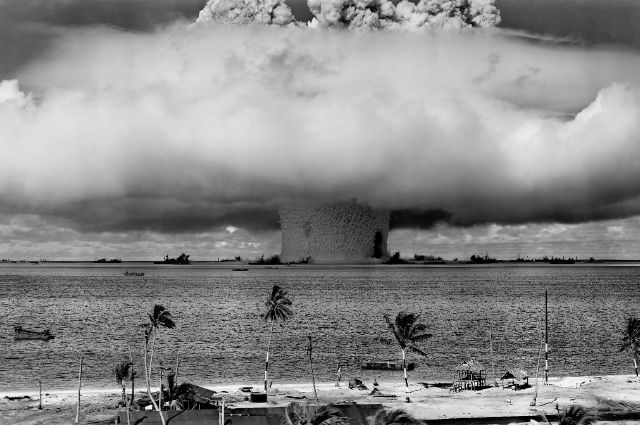
Nuclear proliferation—the spread of nuclear weapons and related technology to nations not recognized as Nuclear Weapon States under the Treaty on the Non-Proliferation of Nuclear Weapons (NPT)—has been a central issue in international relations since the dawn of the atomic age. The debate centers on whether the dissemination of nuclear capabilities contributes to global peace through deterrence or propels humanity toward potential annihilation.
Historical Context
The atomic bombings of Hiroshima and Nagasaki in 1945 marked the beginning of the nuclear era, demonstrating the unparalleled destructive power of nuclear weapons. In response, the NPT was established in 1968 to prevent the spread of nuclear weapons, promote disarmament, and facilitate the peaceful use of nuclear energy. Despite these efforts, several countries have developed nuclear arsenals outside the NPT framework, raising questions about the treaty's effectiveness and the future of global security.
Arguments For Nuclear Proliferation
- Deterrence and Mutual Assured Destruction (MAD): Proponents argue that when multiple nations possess nuclear capabilities, the principle of MAD ensures that no rational actor would initiate a nuclear conflict, knowing it would lead to mutual destruction. This balance of power is believed to maintain peace and prevent large-scale wars.
- National Security and Sovereignty: For some countries, acquiring nuclear weapons is seen as a means to safeguard national sovereignty against external threats. For instance, public opinion in South Korea has shifted towards supporting the development of an independent nuclear arsenal in response to regional security concerns.
- Strategic Leverage: Nuclear capabilities can provide nations with greater influence in international diplomacy, allowing them to negotiate from a position of strength.
Arguments Against Nuclear Proliferation
- Increased Risk of Nuclear Conflict: The more nations that possess nuclear weapons, the higher the probability of their use, whether intentionally, accidentally, or through miscalculation. The existence of these weapons creates a temptation and risk of use, perpetuating a cycle of fear and insecurity.
- Nuclear Terrorism: The spread of nuclear materials and technology heightens the risk of these assets falling into the hands of non-state actors or terrorist organizations, posing a significant global threat.
- Undermining Non-Proliferation Efforts: Proliferation challenges international treaties like the NPT, weakening global norms against the spread of nuclear weapons and potentially triggering regional arms races.
- Ethical and Humanitarian Concerns: The catastrophic humanitarian and environmental consequences of nuclear weapon use raise profound ethical questions about their proliferation and potential deployment.
Case Studies
South Korea's Nuclear Debate: A decade ago, the idea of South Korea acquiring nuclear weapons was almost taboo, but it has now entered mainstream political debate. A Gallup Korea poll revealed that 73% of South Koreans support developing their own nuclear weapons. The momentum is growing, although achieving nuclear capability would face huge political and practical obstacles. Previously, South Korea relied on the US "nuclear umbrella," but the removal of US nuclear weapons in 1991, and North Korea's accelerating weapons program, has heightened security concerns. President Yoon's earlier suggestions about acquiring tactical nuclear weapons stirred international alarm. The strategic equation in the region has shifted, raising doubts among South Koreans about the US commitment to defend Seoul, especially against the backdrop of a potential nuclear threat. The debate evokes questions similar to those during France's decision to go nuclear in 1961. Although technically feasible, South Korea's path to nuclear armament faces significant international ramifications, potential sanctions, and a complicated transition period. If realized, this move could lead to broader regional and global nuclear proliferation, impacting nations like Japan, Taiwan, and Vietnam.
Iran's Regional Influence and Nuclear Ambitions: In 2024, Iran's regional alliances crumbled as it faced setbacks in Syria, Lebanon, Gaza, and Yemen, leading to a significant loss of influence in the Middle East. In Syria, Sunni rebels ousted the Assad regime, prompting Tehran to withdraw its Revolutionary Guards. Hezbollah leaders were targeted by Israeli air strikes, diminishing its power. The Hamas-controlled Gaza and Houthi rebels in Yemen also faced severe attacks. Domestically, Iran struggled with fuel shortages, economic decline due to sanctions, and public discontent, further weakening the regime established after the 1979 Islamic Revolution. There is a growing debate within Iran about the future of its nuclear program amidst these challenges. Internationally, the loss of Assad in Syria triggered rapid geopolitical shifts, with regional and global powers reassessing their strategies towards Syria and the broader Middle East.
International Perspectives
The international community remains divided on the issue of nuclear proliferation. While some nations advocate for complete disarmament, others perceive nuclear capabilities as essential for their security. The United Nations continues to play a pivotal role in facilitating dialogue and promoting treaties aimed at reducing nuclear arsenals and preventing proliferation.
Conclusion
The debate over nuclear proliferation presents a complex dilemma. While the possession of nuclear weapons by multiple states may create a deterrent effect, it simultaneously increases the risks of accidental or intentional nuclear conflict, proliferation to non-state actors, and ethical concerns regarding mass destruction. The international community continues to grapple with finding a balance between deterrence and disarmament to ensure global security.
. . .
References
- "Should South Korea have nuclear weapons? Its people now say yes." The Times.
- "The remarkable collapse of Iran's powerful alliances." The New Yorker.
